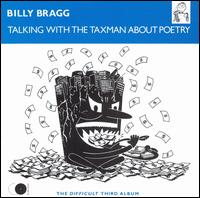Talking with the Taxman about Poetry
| Talking with the Taxman About Poetry | ||||
|---|---|---|---|---|
 |
||||
| Studio album by Billy Bragg | ||||
| Released | September 1986 | |||
| Recorded | March–July 1986 Livingston Studios, London |
|||
| Genre | Rock | |||
| Length | 38:06 | |||
| Label |
Go! Discs (UK) Elektra (US) |
|||
| Producer | Kenny Jones, John Porter | |||
| Billy Bragg chronology | ||||
|
||||
| Professional ratings | |
|---|---|
| Review scores | |
| Source | Rating |
| AllMusic | |
| Encyclopedia of Popular Music | |
| Rolling Stone | |
| The Rolling Stone Album Guide | |
| Spin Alternative Record Guide | 8/10 |
| The Village Voice | B+ |
Talking with the Taxman About Poetry is the third album by Billy Bragg, released in 1986. With production by John Porter and Kenny Jones, Talking with the Taxman About Poetry featured more musicians than Bragg's previous works, which were generally little more than Bragg himself and a guitar.
There were two singles released from the album. While "Levi Stubbs' Tears" peaked at No. 29 in the UK, the follow-up "Greetings to the New Brunette" fell short, only managing No. 58 a few months later.
The album's title is also the title of a Vladimir Mayakovsky poem, which appears as part of the liner notes.
The song "There Is Power in a Union" is based on the song "Battle Cry of Freedom".
"Levi Stubbs' Tears" refers to songwriter Barrett Strong, producer Norman Whitfield, the members of the Holland-Dozier-Holland songwriting and production team as well as Levi Stubbs and the Four Tops.
The original album cover has the subtitle "The Difficult Third Album".
The album was also included in the book 1001 Albums You Must Hear Before You Die.
All tracks written by Billy Bragg, except where noted.
...
Wikipedia
